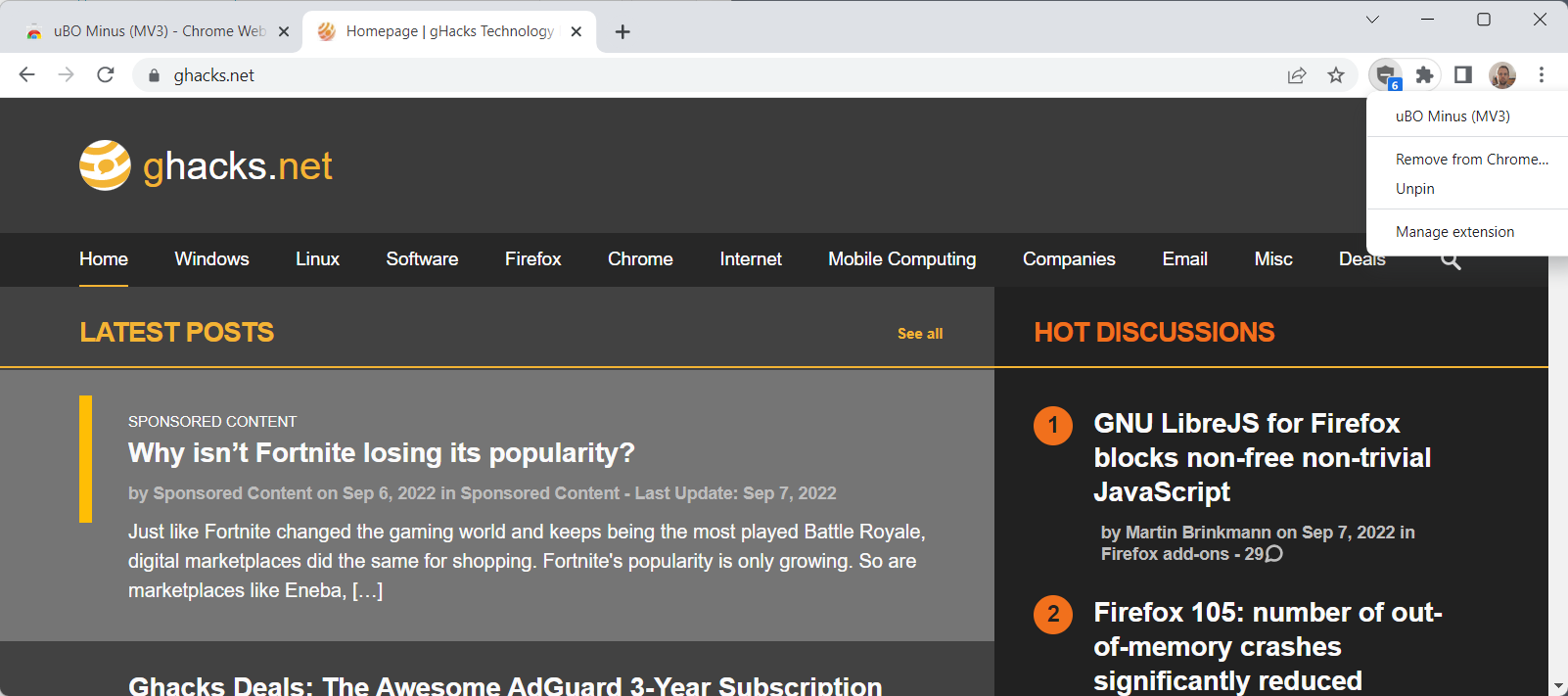Raymond Hill, the creator of the popular content blocker uBlock Origin, has published the experimental extension uBO Minus for Chromium-based browsers. (Update: it is now tabbed uBlock Origin Lite)

The experimental extension is based on Google's Manifest V3 for extensions, which changes things significantly for extensions such as uBlock Origin.
From January 2023 on, Google will woodcut extensions that rely on Manifest V2 in Chrome. There is an Enterprise-policy that extends the cut-off stage to June 2023. From June 2023 onward, Manifest V2 extensions are no longer supported. Installed extensions will not run anymore and new extensions can't be installed at all in Chrome anymore.
Google claims that Manifest V3 improves privacy by removing capabilities from extensions. Rogue extensions may use the capabilities to spy on users. A side-effect, or so it seems, is that privacy and content blocking extensions may run with limited functionality only. Google, earning most of its revenue from advertising, may goody from this.
The experimental extension uBOMinus is uniform with Manifest V3. The minus indicates that it is not as powerful as uBlock Origin. Hill reveals that uBO Minus uses the declarativeNetRequest API exclusively, which Google introduced in Manifest V3 to replace increasingly powerful APIs of Manifest V3.
The extension does not require any uneaten permissions, including the "read and transpiration all your data on all websites" permission. The magnitude of this is that unrepealable features are not supported by it. Hill lists cosmetic filtering, scriplet injections, CSP, redirect and removeparam filters specifically.
The Chrome extension uBO Minus uses the same default filter set as uBlock Origin, but in optimized form to take into worth the limitations of Manifest V3.
Chrome users who want to requite uBO Minus a try may download and install it from the Chrome Web Store. New versions of uBO Minus will be released slantingly the regular uBlock Origin extension for Chromium-based browsers and Firefox.
The extension has a simple interface, which highlights the number of obstructed items only.
Closing Words
Chrome users who rely on content blockers may encounter major issues from January 2023 on. Some may want to trammels out other browsers, either those with seated content blockers, such as Brave, Vivaldi or Opera, or Firefox, which will protract to support uBlock Origin fully.
Browsers based on Chromium squatter spare problems once the transpiration lands. While it is in theory possible to yo-yo the lawmaking to protract support for Manifest V2, or at least some of the misogynist APIs, browser makers would have to launch their own extension repositories as the Chrome Web Store won't host any Manifest V2 extensions anymore without January 2023.
UBO Minus is the second extension for Chromium-based browsers that relies on Manifest V3 exclusively. AdGuard released AdGuard AdBlocker MV3 recently, which does as well.
Content blocking will be variegated when Manifest V2 support is dropped. Some users may not notice a difference, if they rely on vital filtering only. Those who subscribe to increasingly filter lists or use multiple privacy extensions that do filter requests, may run into the strained limitation.
Many Chrome users are probably unaware of the spoken changes at this point. Those who know well-nigh it, may want to trammels out other browsers that won't be unauthentic by the change.
Now You: what is your take on this?
Thank you for stuff a Ghacks reader. The post uBlock Origin Minus: an experimental Manifest v3 uniform extension appeared first on gHacks Technology News.
